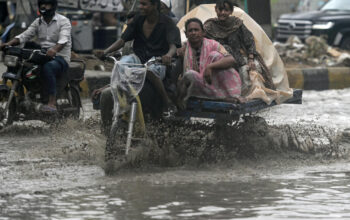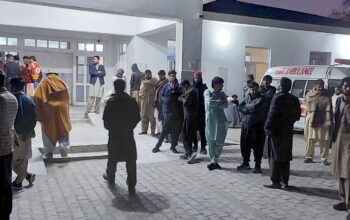By Staff Reporter
ISLAMABAD: Pakistan is preparing for its first heatwave of the season, with temperatures expected to climb well above seasonal normal from Thursday through the weekend, the Pakistan Meteorological Department (PMD) said.
A high-pressure system will dominate the region from May 15 to 20, pushing daytime temperatures to dangerously high levels. In southern Sindh and Punjab, and Balochistan, readings are forecast to be 4 to 6 degrees Celsius above average.
Central and upper Punjab, Islamabad, Khyber Pakhtunkhwa, Azad Jammu and Kashmir, and Gilgit-Baltistan will see temperatures 5 to 7 degrees Celsius higher than normal from May 15 to 19.
Relief may arrive late, as a westerly weather system is forecast to sweep into the upper regions on the evening or night of May 19, potentially bringing rain, wind, and thunderstorms, along with isolated heavy falls and hailstorms, to areas including Azad Kashmir, Islamabad, the Pothohar region, northeast Punjab, upper Khyber Pakhtunkhwa, and Gilgit-Baltistan on May 19 and 20.
Authorities are urging caution, particularly for children, the elderly, and women. The PMD recommended avoiding direct sunlight and drinking plenty of water. Farmers were advised to adjust schedules and shield livestock. In the north, officials are watching rivers, where rapid snowmelt could swell water levels and spark flooding.
In Punjab, the Provincial Disaster Management Authority (PDMA) issued a heatwave alert, directing commissioners and deputy commissioners to stay on guard. Agencies including school education, health, transport, local government, and Rescue 1122 were ordered to act—ensuring clean water in public areas and readying hospitals for heat-related cases.
The PDMA told residents to safeguard vulnerable groups, limit travel during peak heat, wear light clothing, and cover their heads outdoors. It also stressed conserving water and staying updated.
The National Institute of Health (NIH), which began warning of heatstroke risks last month, said climate change is intensifying Pakistan’s heatwaves, endangering vulnerable populations. It urged hospitals to brace for more patients. For heatstroke symptoms, the NIH advised moving victims to shade, removing extra clothing, and offering cool water, with hospitalization if needed.
Copyright © 2021 Independent Pakistan | All rights reserved




